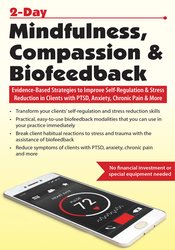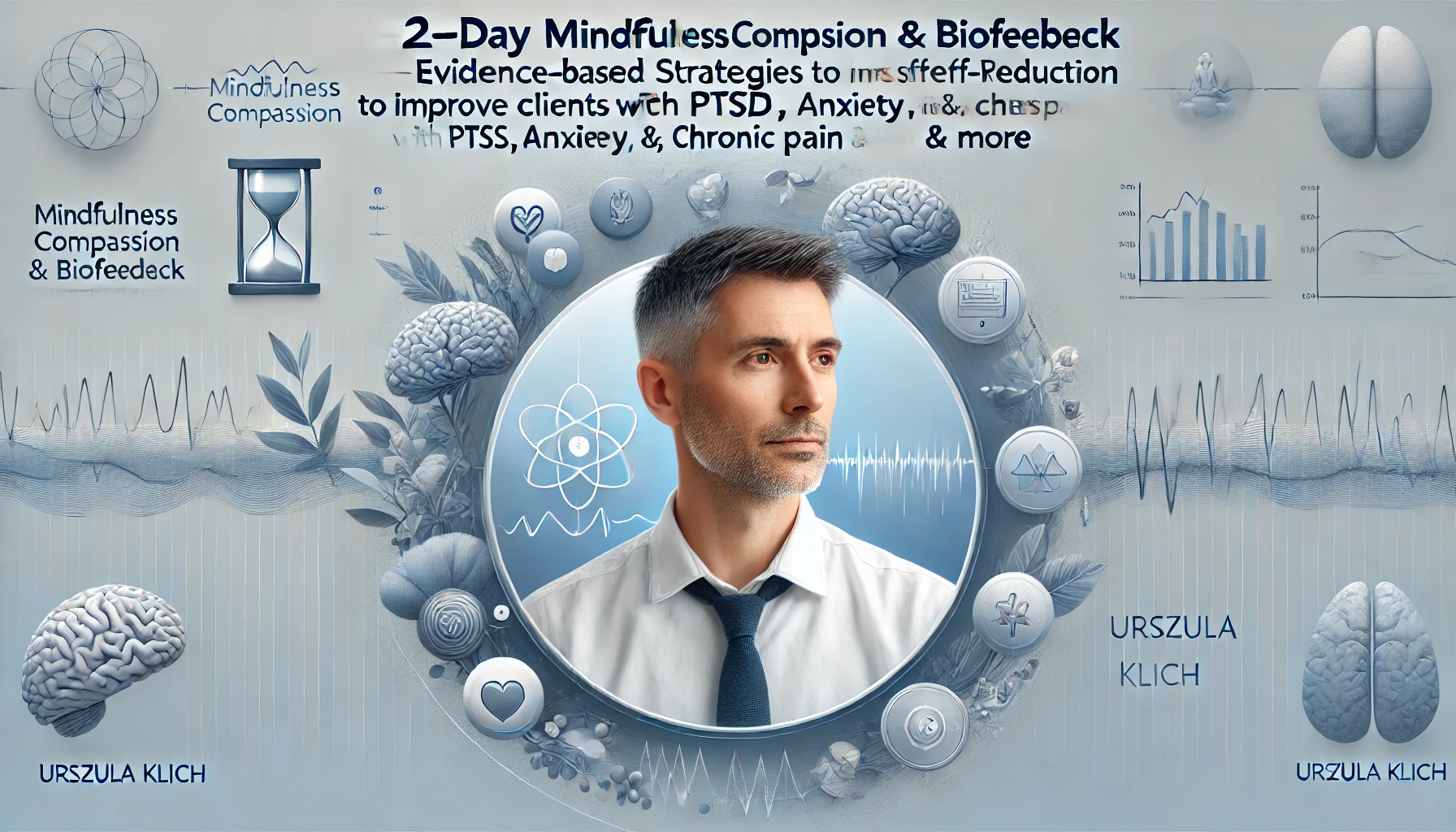2-Day Mindfulness, Compassion & Biofeedback-Evidence-Based Strategies to Improve Self-Regulation & Stress Reduction in Clients with PTSD, Anxiety, Chronic Pain & More – Urszula Klich
2-Day Mindfulness, Compassion & Biofeedback-Evidence-Based Strategies to Improve Self-Regulation & Stress Reduction in Clients with PTSD, Anxiety, Chronic …
Overview
Discover the Best Learning with 2-Day Mindfulness, Compassion & Biofeedback-Evidence-Based Strategies to Improve Self-Regulation & Stress Reduction in Clients with PTSD, Anxiety, Chronic Pain & More – Urszula Klich
WisMentor is your ultimate destination for online learning. Explore "2-Day Mindfulness, Compassion & Biofeedback-Evidence-Based Strategies to Improve Self-Regulation & Stress Reduction in Clients with PTSD, Anxiety, Chronic Pain & More – Urszula Klich" by top authors and instructors, designed to transform your skills and career. Start now and unlock your potential!
Author: Urszula Klich
- Faculty:
- Urszula Klich
- Duration:
- 2 Full Days
- Format:
- Audio and Video
- Copyright:
- Sep 24, 2019
Description
Clients with PTSD, anxiety, depression or chronic pain often struggle with distress-tolerance and poor emotional regulation. These clients are often unable to cope with navigating through difficult treatment because they can’t access thoughts and feelings beyond the immediate moment.
Week after week, this leaves you feeling like you’re having the same session repeatedly with no improvements. You’ve become frustrated and are not sure what to do next.
Transform your clinical outcomes by integrating Mindfulness-Based Biofeedback into your practice!
Mindfulness-Based Biofeedback can complement any treatment approach and has been demonstrated to improve numerous physical and emotional health symptoms including those associated with chronic pain, anxiety, stress and depression.
In biofeedback treatment, individuals learn about their emotional state by taking biological measurements, such as temperature or respiration rate, and use that information to choose mindfulness and compassion techniques to target and change symptoms of high stress or dysregulation.
You’ll be able to teach these skills to your clients so that they can become aware of their bodies and “see” their mood states, emotions and stress levels – with little to no financial investment required.
Watch Dr. Urszula Klich, PhD, BCB, and discover the exponential benefits of combining two rigorously studied scientific methodologies into a modality that is useful for clinical practice and overall health and wellbeing. Dr. Klich will walk you step-by-step through the process of using biofeedback and mindfulness together with the goal of helping your clients develop stress-reduction and self-regulation skills.
You’ll learn how to utilize affordable, easy-to-use, portable biofeedback modalities in session and how to teach your clients to use them at home.
Watch this hands-on, experiential recording, and you’ll leave with valuable skills and tools that you can apply immediately to transform your practice.
Purchase today to master Mindfulness-Based Biofeedback and transform stress-reduction and self-regulation for your clients!
Handouts
| Manual – 2-Day Mindfulness, Compassion & Biofeedback (8.42 MB) | 94 Pages | Available after Purchase |
Outline
Integrate Biofeedback into Your Practice
- Biofeedback purpose and benefits
- Assess client reactivity
- Efficacy for various mental health conditions
- What happens when clients try to relax
- Stress & it’s relationship to pain
- How biofeedback works
- Choose the right tool for the job
- Usability and portability considerations
- Treatment goals
- Billing & documentation considerations
- Limitations of research & potential risks
- Practice Exercises: Using different biofeedback modalities
Respiration Biofeedback: Step-by-Step
- Meditation & the breath
- Assess dysfunctional breathing
- Symptoms of overbreathing
- Overbreathing & mental health
- Biofeedback modalities for breathing regulation
- Apps for use with respiration biofeedback
- Overcome barriers to improvement
- Practice Exercise: Respiration biofeedback
Thermal Biofeedback: Step-by-Step
- Symptoms of vasoconstriction
- Thermal biofeedback modalities
- Use thermal biofeedback to reduce level of arousal
- Teach clients to regulate temperature
- Integrate autogenic training & thermal biofeedback
- Practice Exercise: Hand temperature
Mindfulness & Compassion: Essential Skills for Use with Biofeedback
- Strategies to improve client engagement
- Promote psychological flexibility and adaptive functioning
- Autogenic training: Step-by-step
- Cognitively-Based compassion training
- Practice Exercise: Mindfulness & compassion
Mindfulness-Based Biofeedback Step-by-Step: Boost Clinical Effectiveness by Combining Mindfulness and Biofeedback
- Integrate physical, cognitive & emotional well-being
- When to use mindfulness-based biofeedback
- Assess client nervous system reactivity
- Biofeedback-driven goals
- ”Activate” the parasympathetic nervous system
- Help clients explore their values
- Take a strengths inventory
- Complementary relaxation techniques
- Utilize the MBB Cognitive Awareness Log
- Biofeedback-assisted body scan
- Barriers to mindfulness-based biofeedback
- Practice Exercises: Mindfulness-based biofeedback techniques
Mindfulness-Based Biofeedback for Skills Development
- Choose the best combination of mindfulness practices & biofeedback modalities
- What to monitor & when
- Take-home worksheet resources
- Help clients transition behaviors into habits
- Relapse or normal fluctuations in learning?
- Client homework: Simple starting points
- Practice Exercises: Use biofeedback for skills development
- Attention & prevention
- Distraction
- Thought management
- Awareness
- Problem reconceptualization
- Tension reduction
- Self-regulation
Mindfulness-Based Biofeedback in Action: Confidently Tailor for Use with Specific Disorders & Special Clinical Populations
- PTSD
- Anxiety and panic
- Depression
- Chronic & acute pain
- Headaches
- Military
- Couples
- Children
Faculty
Urszula Klich, Ph.D., BCB Related seminars and products: 1
My Mindful Way
Dr. Urszula Klich, Ph.D, BCB, is a clinical psychologist, speaker, and author who teaches self-regulation to maximize physical and emotional health. She is a certified meditation teacher in Cognitively-Based Compassion Training (CBCT) through Emory University and has served on various medical teams.
She is board certified in biofeedback and is the president of the Southeast Biofeedback and Clinical Neuroscience Association. Her specialized program of Mindfulness-Based Biofeedback (MBB) has been published and widely applied from hospitals to classrooms based on the premise that integrating mindfulness and compassion-informed treatment with psychology fosters individuals’ healing power to improve physical, emotional, and spiritual well-being.
Living mindfully is advantageous and accessible to anyone who recognizes a need for a shift in their lives and sets an intention to move forward. She is a sought-after workshop leader and internationally recognized speaker in health and wellness.
Speaker Disclosure:
Financial: Urszula Klich maintains a private practice. She receives a speaking honorarium from PESI, Inc.
Non-financial: Urszula Klich is president of the Southeast Biofeedback and Clinical Neuroscience Association.
About 2-Day Mindfulness, Compassion & Biofeedback-Evidence-Based Strategies to Improve Self-Regulation & Stress Reduction in Clients with PTSD, Anxiety, Chronic Pain & More – Urszula Klich and Our Expert Authors
2-Day Mindfulness, Compassion & Biofeedback-Evidence-Based Strategies to Improve Self-Regulation & Stress Reduction in Clients with PTSD, Anxiety, Chronic Pain & More – Urszula Klich is part of our extensive collection of over 70,000 premium courses at WisMentor. Created by renowned authors and industry leaders, this course is tailored to provide cutting-edge knowledge and actionable insights.
Why Choose WisMentor?
- 🌟 Access courses from world-renowned authors.
- 📚 Wide range of topics to suit your professional and personal growth needs.
- 💼 Lifetime access and flexible learning options.
Key Features of 2-Day Mindfulness, Compassion & Biofeedback-Evidence-Based Strategies to Improve Self-Regulation & Stress Reduction in Clients with PTSD, Anxiety, Chronic Pain & More – Urszula Klich:
- ✅ Comprehensive content covering essential topics.
- ✅ Evidence-based methodologies and practical examples.
- ✅ Learn at your own pace with expert guidance.
How to Access Your Course?
Getting started is easy:
- 📩 Receive an instant download link via email.
- 🌐 Access your course anytime through your account dashboard.
- 📱 Compatible with all devices for a seamless experience.
Need Help?
Our dedicated support team is here to assist you. Visit our Contact Us page or reach out via email for any queries or assistance.
More from Our Collection:
Don’t miss the opportunity to explore more courses from top authors and enrich your learning journey at WisMentor. Find your next course now and take your skills to the next level.
Curriculum
FAQs
Requirements
- A commitment to engaging in experiential learning and self-reflection exercises during the course.
- Participants should have a foundational understanding of psychological principles and therapeutic practices.
Features
- Expert Instruction: Led by Urszula Klich, a recognized expert in the field, providing valuable insights and guidance.
- Interactive Learning: The program includes practical exercises, case studies, and real-world applications to ensure skill development.
- Evidence-Based Strategies: Participants will learn scientifically supported methods to address PTSD, anxiety, chronic pain, and other related conditions.
- Comprehensive Curriculum: The course covers the integration of mindfulness, compassion, and biofeedback techniques to enhance self-regulation and stress reduction.
Target audiences
- Educators and individuals interested in integrating mindfulness and biofeedback techniques into their practice.
- Medical practitioners such as nurses, physicians, and allied health professionals.
- Mental health professionals, including psychologists, social workers, psychiatrists, and counselors.


